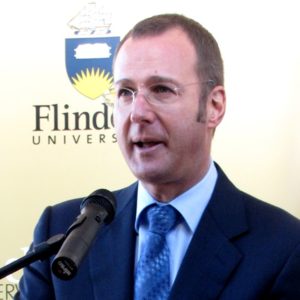
The Ebola epidemic has thrown the spotlight on the shortage of health care workers in Africa, with many countries facing major challenges to rebuild, said Professor Michael Kidd, the Executive Dean of the Faculty of Medicine, Nursing and Health Sciences at Flinders University.
The worst of the crisis has been felt in the West African nations of Liberia, Sierra Leone and Guinea, where already community health care was well below World Health Organization standards, Professor Kidd told the 4th World Organization of Family Doctors (WONCA) Africa Conference in Accra, Ghana this month (6 May).
“This region of the world has faced huge challenges over the past year, especially from the impact of the Ebola crisis,” said Professor Kidd, who is WONCA President.
“As you know, many front-line doctors and nurses were among the victims of Ebola and this has left the health services in affected countries vulnerable and unable to cope with meeting the continuing health-care needs of their communities,” Professor Kidd said.
“I hope this conference will tackle how we can work together to support rebuilding the health care services in the countries of this region that have been affected by the Ebola crisis, especially Liberia, Sierra Leone and Guinea, and reinforce the need to focus on strengthening community-based health care services in all nations in Africa.”
Professor Kidd is attending the World Health Organization’s annual World Health Assembly in Geneva this week (18-20 May 2015), where the Ebola crisis in Africa will be discussed in a global context.
While Liberia was declared Ebola-free on May 9, current estimates are that there have been more than 26,000 cases and more than 11,000 deaths in the latest Ebola outbreak.
In the worst affected area of West Africa, the outbreak has had an unprecedented effect on already struggling services, with more than 820 health care workers infected and the death toll now approaching 500.
Professor Kidd said another part of the tragedy was the flow-on effect of “paralysed” health services being unable to provide care for other needs of the affected communities, particularly in rural and remote areas.
Already Africa faced a “huge discrepancy between the high burden of disease and the scarcity of health care workers, particularly doctors” compared to the rest of the world.
He said family medicine and community care plays a major role in tackling enormous health challenges including high rates of infant and maternal mortality, HIV-AIDS, TB infection, endemic malaria, non-communicable diseases, violence, trauma and pervasive poverty.
“We need to strengthen the whole primary health care workforce, including family doctors, community nurses, community health workers, and traditional birthing assistants, and support us working together to deliver appropriate care to all people,” he said.
“People in low income countries still want and deserve access to health care for themselves and the members of their families, access to caring clinicians, access to life saving medications. We need to tackle the shortages of health care workers in the countries of this region.”
Rebuilding capacity and, indeed, self-reliance in developing countries was a key role for WONCA to support member organisations for education and training for members of the family medicine workforce in Africa, he said.
“We will probably never be able to quantify the preventable deaths from other conditions that occurred as a result of the loss of health care services,” Professor Kidd said.
“How many children died of malaria and pneumonia and gastroenteritis in countries where the health care systems had collapsed? How many women died as a result of loss of maternal health services?”
“This is often exacerbated by the migration of health care workers, particularly after the Ebola crisis.
“As the world considers the new United Nations Sustainable Development Goals … the evidence is clear that the most cost-effective way to decrease morbidity and mortality and increase positive health outcomes in a population is through a well-developed system of primary care services that ensure accessible, comprehensive, coordinated, and people-centred care,” he said.
A full version of Professor Kidd’s speech in Ghana is available online.
The UN has announced 17 Sustainable Development Goals and targets to follow the Millennium Development Goals for 2000-2015, which included eight aspirational goals agreed by all the world’s countries, including to halve extreme poverty rates, provide primary school education to all children, empower women, reduce infant and maternal mortality, combat HIV, tuberculosis and malaria, and ensure the sustainability of our environment.
World Family Doctor Day on 19 May was declared by the World Organization of Family Doctors in 2010 as a day to highlight the role and contribution of family doctors in health care systems around the world.

